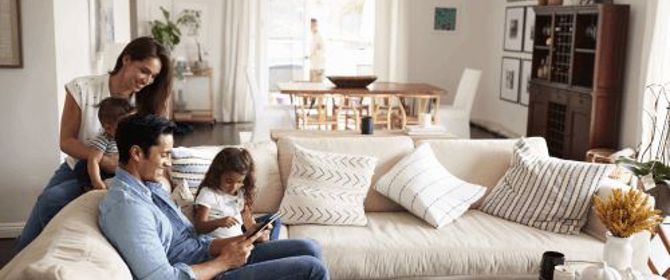How Much Is The Average UK Home Energy Bill?
In this guide, we’ll highlight average energy bill costs and advise you on how you can save on your utilities.
May 2023
| Money Saving

Get a comparison and start saving now
Most of us spend a considerable amount of time in our living rooms. It’s where we relax, interact with our family and enjoy our favourite television shows. Due to this, we tend to use a lot of energy in this area and this can have a huge impact on our energy bills.
But not to worry, we’ve created this handy guide to give you some top tips for saving energy in your living room.
There are plenty of ways in which you could increase the levels of energy efficiency in your living room. These include:
Firstly, make sure your home is well insulated. This will make it easier to heat your home and cost you less in energy bills.
If you are renting, you can still improve insulation by investing in heavy curtains for windows, with an inner lining to make sure heat is kept inside. If you have a radiator underneath your window, make sure that the curtains don’t hang over them as this could cause heat loss.
Sealing any gaps around windows or doors that cause a draft in your living space will also help your living room warm up faster.
For the majority of people, electricity and gas bills are at their highest during wintertime. The cold weather in the UK often has us turning on our heating at full blast.
Although tempting, this can result in high energy bills. Fortunately, there are lots of ways in which you can reduce the energy you need to heat your home.
Get into the habit of wearing comfortable, warm clothes when inside. Make sure your living room has plenty of cushions and blankets to keep you cosy.
Of course, you’ll need to turn on the heating sometimes. But you could reduce your energy consumption by only turning on the radiator in the living room when you are using it, if this is possible in your home.
Never turn your thermostat up to full blast, as tempting as it might be! It won’t help your rooms heat up any faster. See if you are comfortable at 18 degrees and turn it up gradually.
Our living rooms are full of electronic devices. Television and entertainment systems, stereos and games consoles and endless chargers that all use energy.
When on standby mode, these devices will continue to use energy. One of the easiest ways to be more energy-efficient is to unplug these devices when they are not in use.
According to the Energy Saving Trust, switching your appliances off standby could save you around £35 annually.
Making sure your lighting is energy-efficient is another great way to save energy in your living room.
Check that your lightbulbs are energy saving, with low watt usage. If you are investing in new lighting, remember that LED lighting is the most energy-efficient. Replacing all your lightbulbs with LED lights could help save you up to £40 a year on your energy bills.
Installing a dimmer switch can also help reduce your bills. Dimmer switches will keep the power you use for lighting to a minimum. And of course, there’s always candles!
Some additions to your home can help keep you warm simply by being there.
Carpets and rugs could not only help to keep your feet warm, but they can actually reduce the amount of energy you need to heat your home by blocking draughts.
Keeping some plants in your living room is also good for energy consumption. Potted plants release oxygen and reduce harmful toxins in the air. They also release moisture which creates humidity and makes your living room feel warmer.
Most electronic devices sold in the UK have an energy rating label. Make sure that the next time you are investing in a new appliance for your living room you choose the most energy-efficient product available. This will save you money in the long term by reducing running costs.
If you often use more than one electronic device at once, consider investing in a smart power adaptor or strip.
Perhaps most importantly, try to be conscious of the energy you are using. If you have a smart meter, this is easy to do.
For those who have a prepayment meter, if you make a note of the credit remaining on your meter at the same time every day you will be more aware of the energy you are using.
Reminding yourself that the energy you are using is costing you money is often good motivation to get into the habit of unplugging devices and turning off lights when they are not in use.
Finally, using energy efficiently in your living room is not the only step you need to take if you are looking to reduce your energy bills.
You must also ensure that you are on a suitable home energy tariff. Being on the wrong deal could lead to excessively high bills.
To find out how much you could save on your home energy and if it is worth switching energy suppliers, try our free energy comparison tool today.
Or, you can find more energy saving tips by taking a look our latest energy guides and advice.
Related Articles
In this guide, we’ll highlight average energy bill costs and advise you on how you can save on your utilities.
May 2023
Get a comparison and start saving now